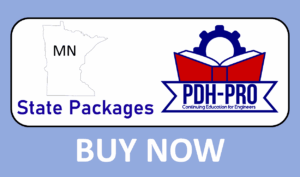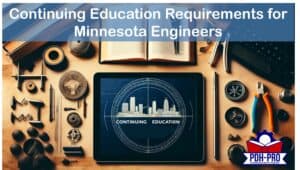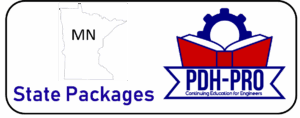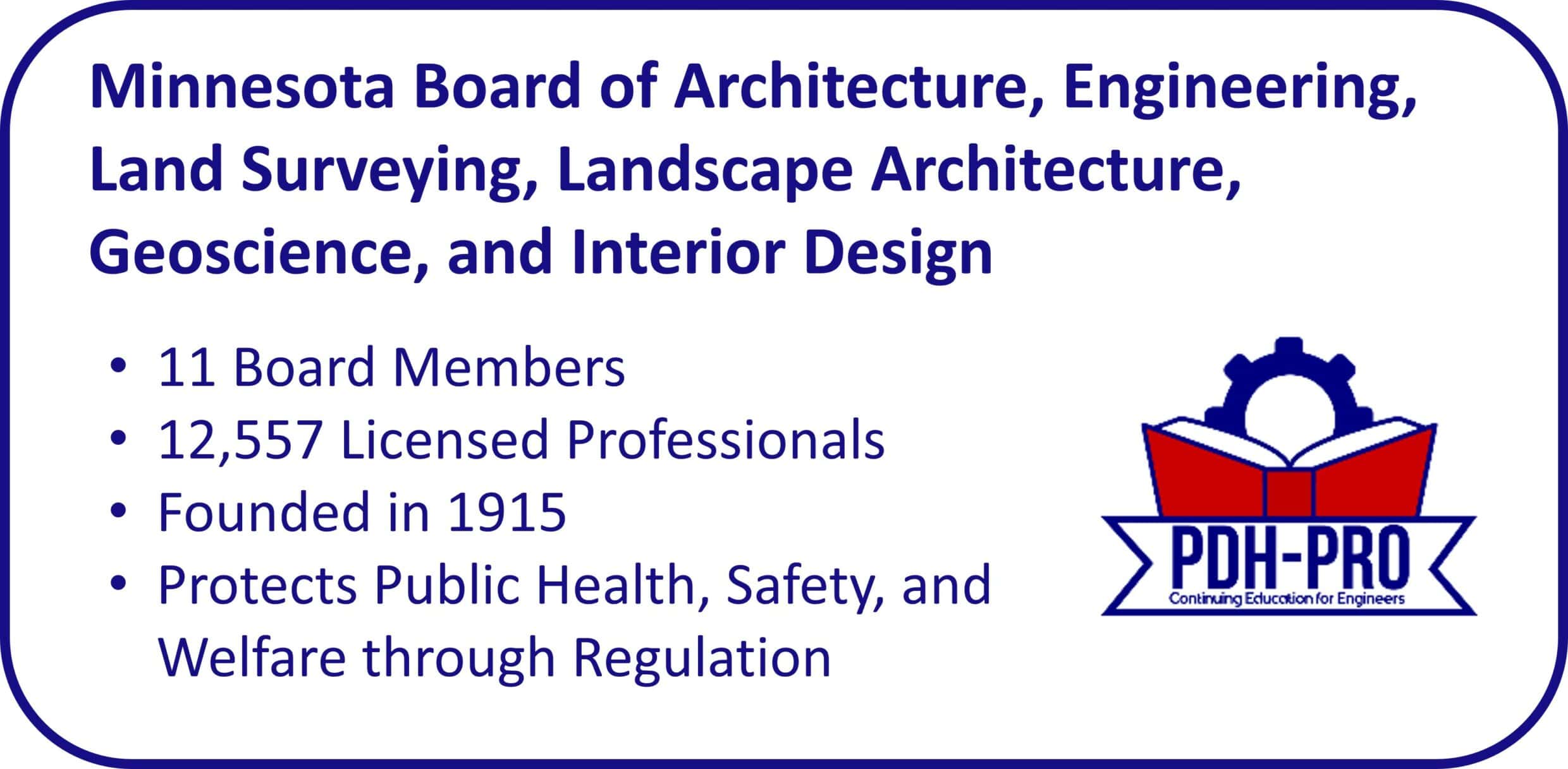CEU Requirements for Minnesota Professional Engineers
Are you a Minnesota PE looking to renew your license? If so, you’re probably wondering – What are the continuing education requirement for Minnesota professional engineers?
For professional engineers in Minnesota to renew their licenses, they must complete 24 hours of personal development continuing education courses biennially. Those courses can be completed online, but at least 2 hours must be in ethics. The renewal date is June 30 on even years. Up to 12 PDH completed above the required 24 can be used in the following renewal cycle, but none can be in ethics.
For a complete list of all license renewal requirements check out our Minnesota PE renewal page.
Minnesota PDH Credits
The Minnesota Board of Architecture, Engineering, Land Surveying, Landscape Architecture, Geoscience, and Interior Design (AELSLAGID) mandates engineers complete 24 personal development hours biennially in continuing education courses in ethics, regulatory, technical, non-technical and business practice activities. This ensures professional engineers have a well-rounded education that can directly benefit the public’s health, safety and welfare.
The purpose of PDH activities must be to maintain, improve, or expand the knowledge and skills the engineer obtained prior to their initial licensure. Course providers and courses don’t have to be pre-approved by the board and online PDH courses are acceptable if they feature quizzes and exams. The engineer’s completion records have to be maintained for 2 to 4 years. Electronic renewal is available from April through June on even numbered years.
Minnesota License Renewal Dates
The license renewal date is June 30 on even numbered years. Engineers must complete the license renewal form and send it to the board with proof they have completed their continuing education requirements, any other pertinent documents and a check or money order for $180. Proof PDH courses were completed must be retained for two to four years.
Engineering Ethics and Professional Conduct
For license renewal engineers in Minnesota must complete two hours of professional ethics continuing education courses biennially. The ethics courses needn’t be engineering specific. The other 22 hours of continuing education courses can be in regulatory, technical, non-technical and business practice activities that can directly improve the public’s health, safety and welfare.
Records Keeping Requirements for Engineers
Licensed engineers must maintain records of their completed courses and activities for their continuing education PDH. Record should show when classes or activities took place, subjects covered, activity or program duration, number of PDH earned, registration receipts where applicable and the name of the organization that sponsored them.
The records must be maintained for four years after the licensure period to which they were applied ended. The board may request this information to verify a renewal application, address noncompliance complaints against the engineer, or for a random audit. Maintaining supporting documentation is the engineer’s responsibility.
Continuing Education Activities Accepted by the Board
For online courses, live webinars, self-study courses or other activities to be accepted as continuing education PDH by the board towards an engineers license renewal, they must have evidence of pre-planning, be properly organized and presented sequentially. Their purpose and objective must be clear and help enhance the engineer’s professional knowledge and skills. The course’s presenter must have education or experience qualifying them to do so. The course’s creator must have appropriate documentation, record keeping and reporting to prove the engineer’s participation.
Some Acceptable Courses and Activities
Some PDH acceptable courses and activities for engineers in Minnesota include:
- Completing or auditing college courses
- Self-study courses ending with an exam
- Televised or videotaped short courses, seminars or tutorials
- Prepared in-house self-sponsored educational programs
- Visual or written study tours having structured programs presented by the licensee
- Instructing or presenting qualifying seminars or courses
- Preparation for first time presentations
- Authoring published articles, books or papers
- Preparation for writing or presenting works
- Grading or writing professional exams (maximum credit five PDH per biennium)
- Sharing professional expertise on commissions, committees and public boards
- Volunteer service on Building Code Advisory Boards, Planning Commissions, Urban Renewal Boards, not work-r related (maximum 10 PDH per biennium)
- Ten Patents for 10 PDH credits in biennium the patent was granted
Some Unacceptable PDH Courses and Activities
It’s the engineer’s responsibility to verify courses or activities’ suitability for meeting continuing education requirements. Some courses and activities that don’t qualify as PDH include:
- College courses not specifically for engineers
- Refresher courses, company orientation and training programs
- Courses previously taken that just have new names
- Self-improvement classes on non-technical topics taken for financial gain
- General safety and first aid courses
- Attending conventions and trade shows
- Membership in clubs or professional societies
Pre-Approval of Continuing Education Activities
The board doesn’t pre-approve continuing education courses or activities. They provide a Continuing Education Assessment Form to help determine whether activities or courses meet the statutory requirements for PDH, so they won’t be rejected by the board.
Sources of Free Continuing Education Courses
Several organizations offer access to free continuing educational courses through their websites. They include engineering societies such as the American Society of Civil Engineers, ASME, NSPE, and others.
Engineering Licensing Requirements
Becoming a state licensed Professional Engineer in Minnesota is a multi-step process. Candidates must successfully complete an engineering program accredited by the Accreditation Board for Engineering and Technology (ABET), pass the Fundamentals of Engineering exam, work in the field for at least 4 years and pass the Principles and Practice of Engineering exam. The 8-hour PE exam is administered by the National Council of Examiners for Engineering and Surveying (NCEES). Passing it shows an engineer has attained a level of competency making them a specialist in their field.
Engineering Discipline Restrictions for Continuing Education Courses
The board doesn’t restrict nor limit the continuing education courses engineers can take. Engineers can take continuing education courses in ethical, regulatory, technical, non-technical and business practice activities if it makes them better, more well-rounded, professionals.
Continuing Education Packages for Minnesota
 Who has time to read all of the Minnesota continuing education rules and regulations? We do. And we used our review to develop packages for MN PEs that include all of the required continuing education PDHs. Our Minnesota Engineering Packages provide a convenient way to renew your engineering license. Our packages are broken down by engineering discipline – chemical, civil, electrical, environmental, geotechnical, mechanical, and structural. They have everything you need to renew your license, guaranteed.
Who has time to read all of the Minnesota continuing education rules and regulations? We do. And we used our review to develop packages for MN PEs that include all of the required continuing education PDHs. Our Minnesota Engineering Packages provide a convenient way to renew your engineering license. Our packages are broken down by engineering discipline – chemical, civil, electrical, environmental, geotechnical, mechanical, and structural. They have everything you need to renew your license, guaranteed.
The Value of Continuing Education
Continuing education is essential to an engineer’s professional growth and development. Ethics courses keep them aware of proper professional conduct while a variety of continuing educational classes broadens their knowledge base and makes them better people and better engineers.

